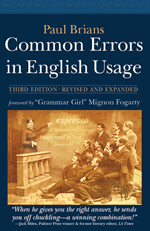Some governmental style guidelines call for “federal” to be capitalized whenever it refers to a function or part of the federal government of the United States. However, in most contexts it is capitalized only in the titles of agencies like the “Federal Bureau of Investigation” and the “Federal Reserve.” If you are not required to follow governmental guidelines it’s “the federal budget,” “federal courts,” and “federal employees.” Of course, in the titles of publications the word is capitalized like any other noun; and if the source you are quoting capitalizes it, you should preserve the capitalization.
Back to list of errors

BUY THE BOOK!
